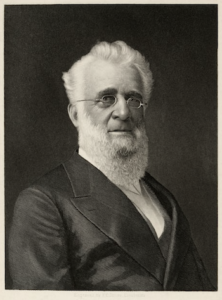
Richard Rust
*Richard Rust was born on this date in 1815. He was a white-American Methodist preacher, abolitionist, educator, writer, and lecturer.
Richard Sutton Rust grew up in Ipswich, Massachusetts. At ten years old, he became orphaned and went to live on his uncle's farm. He attended Phillips Academy and became involved in anti-slavery activities. After hearing a lecture by George Thompson, he helped form an anti-slavery group on campus, for which he was expelled with two other students in 1834 after refusing to disband.
He then attended Noyes Academy, a racially integrated school founded by abolitionists; however, local opposition forced the school to close. He eventually found a school sympathetic to his anti-slavery views, Wilbraham Wesleyan Academy, a school run by the Methodist Episcopal Church, from which he graduated. There, he became an active Methodist. After that, he attended Wesleyan University, lecturing, encountering stiff opposition, and was repeatedly mobbed. During his years at school, he heard abolitionists William Lloyd Garrison, Wendell Phillips, Frederick Douglass, Lucy Stone, and many others speak.
After graduating from Wesleyan University, Rust became the principal of the New Hampshire Conference Seminary of the Methodist Episcopal Church in 1846. In 1858, he helped found Wilberforce University and became the college's first president, a position he held until 1863. During the American Civil War, Rust turned his attention down south. He helped found the Freedmen's Aid Society to give supplies and housing to teachers from the North to teach freed slaves in the South. He helped found as many as 30 colleges and institutions, mainly for teachers, to educate former slaves and their children.
One of these schools was Rust College, the oldest historically black United Methodist-related college. Ida B. Wells was one of the first students taught here in 1870. After the war, he helped set up the Freedmen's Bureau, an agency of the United States Department of War, to "direct such issues of provisions, clothing, and fuel, as he may deem needful for the immediate and temporary shelter and supply of destitute and suffering refugees and freedmen and their wives and children." In 1875 he married Elizabeth Lownes. Lownes was an artist, but upon marrying Rust, she focused on humanitarian and evangelical work. Rust died on December 22, 1906.